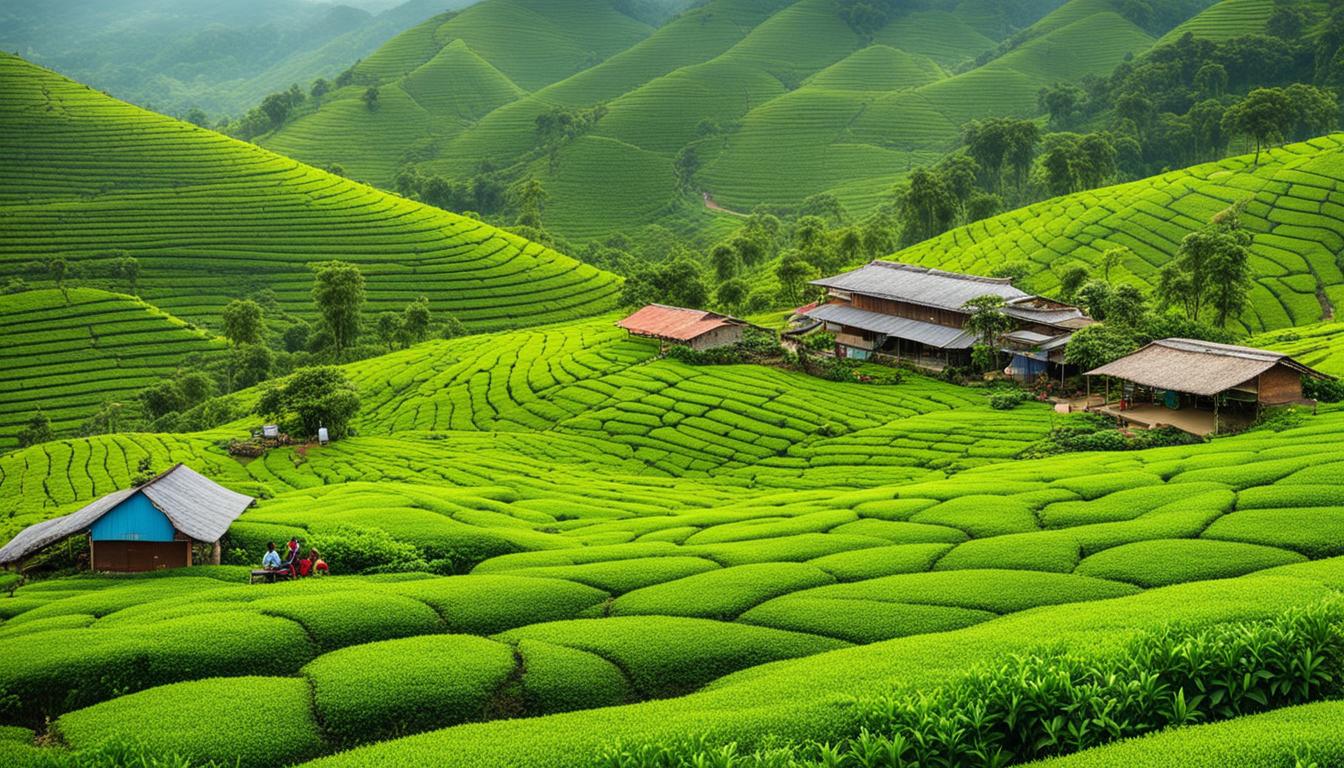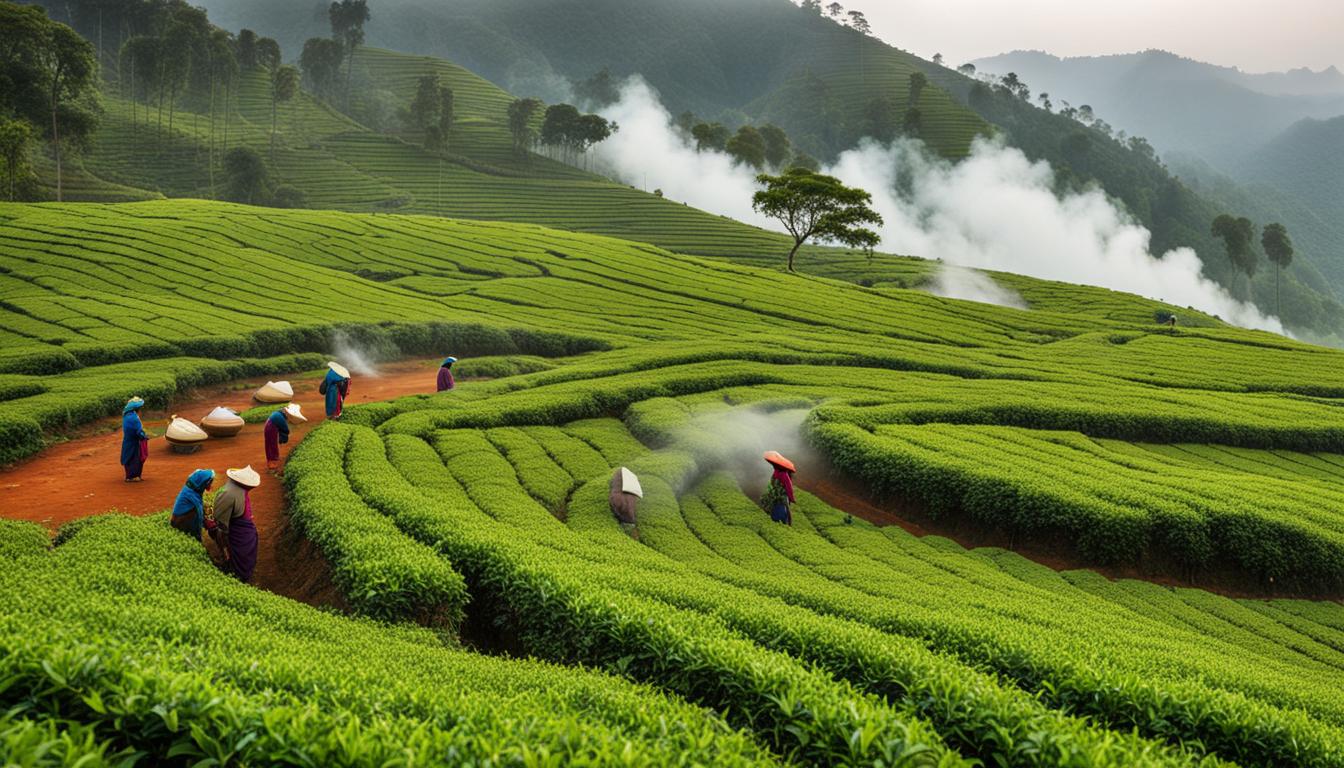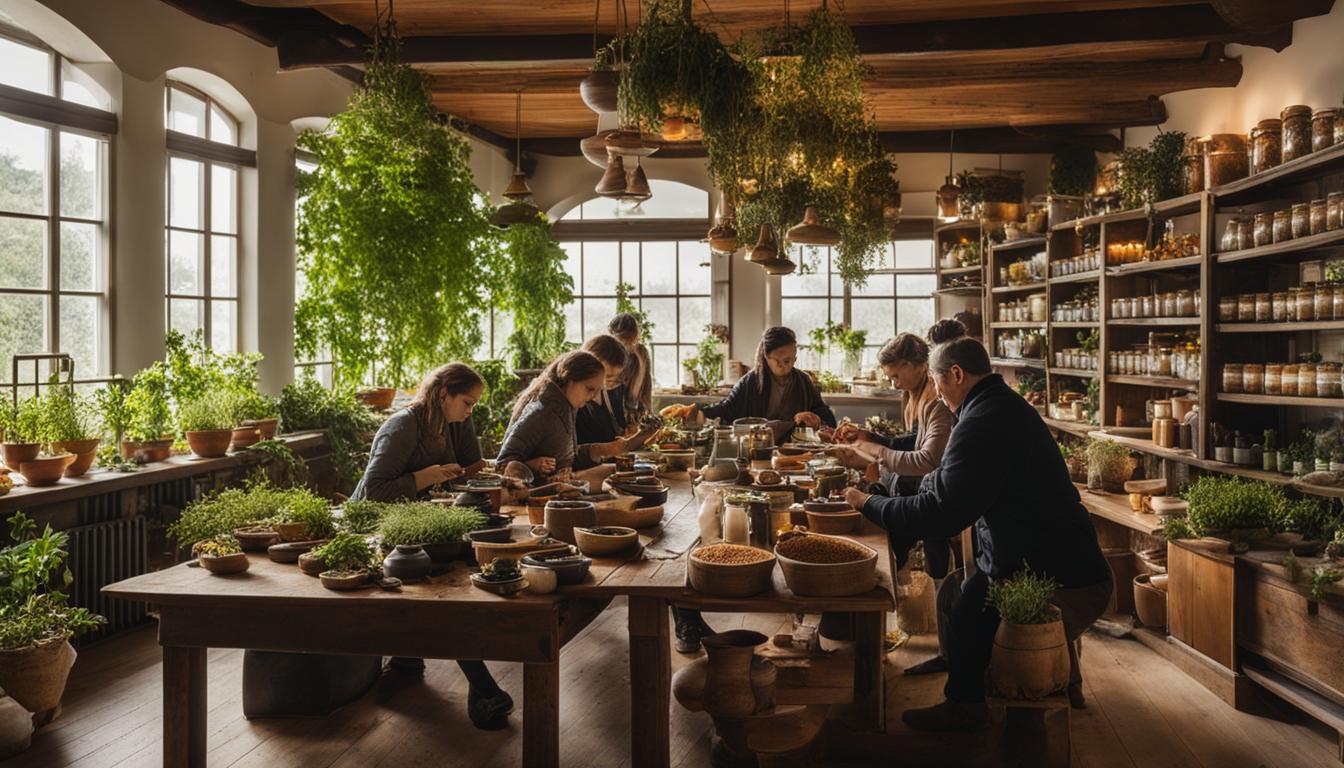Welcome to our article on eco-friendly and sustainable tea tourism practices! In this section, we will explore the significance of sustainable tea garden practices and the need for sustainable tea estate tours. We believe that by embracing eco-friendly practices, we can create a more sustainable and enjoyable tea tourism experience for all.
Tea gardens have long been a popular destination for tourists, offering a unique blend of tea production and tourism. However, it is essential to consider the environmental impact of these activities and find ways to minimize it. By adopting sustainable practices in tea gardens, we can ensure the preservation of nature while still providing visitors with a memorable and enjoyable experience.
Key Takeaways:
- Sustainable tea tourism promotes eco-friendly tea estate tours.
- Eco-conscious practices in tea gardens help preserve the environment.
- Embracing sustainable tea garden practices benefits both the industry and visitors.
- Sustainable tea tourism contributes to the overall goal of environmental conservation.
- Eco-friendly tea estate tours offer a unique and meaningful experience for visitors.
Sustainable Development of Ecotourism in Tea Gardens Based on the Versatility of Organic Agriculture
Organic agriculture is a key factor in promoting sustainable development in tea garden ecotourism. Its multifunctionality and close connection to the tea industry make it an ideal approach to fostering eco-friendly practices and preserving the natural beauty of tea gardens. One notable example of successful sustainable tea garden ecotourism is the Lushan Yunwu Tea Garden, where organic agriculture has played a significant role in maintaining the ecological balance and attracting environmentally conscious visitors.
Incorporating organic farming practices in tea gardens not only ensures the production of high-quality teas but also supports the conservation of biodiversity. By avoiding the use of synthetic fertilizers and pesticides, tea farmers can minimize the negative impact on the environment and protect the health of the soil, water sources, and surrounding ecosystems. This approach resonates with visitors who are seeking authentic experiences in green tea plantation tourism and tea farm environmental conservation tours.
Moreover, the potential of artificial intelligence (AI) technology in sustainable tea tourism should not be overlooked. AI can contribute to the optimization of farming techniques, waste reduction, and energy efficiency within tea gardens. For example, AI-powered irrigation systems can precisely manage water usage based on real-time data, reducing water waste and improving overall resource management. By embracing AI, tea gardens can enhance their sustainable practices while providing visitors with innovative and educational experiences.
Case Study: Lushan Yunwu Tea Garden
“Organic agriculture has transformed our tea garden into a sanctuary for both tea lovers and nature enthusiasts. Through sustainable farming practices, we have not only preserved the ecological balance but also created a unique experience for visitors who appreciate our commitment to environmental conservation.” – Tea Garden Owner, Lushan Yunwu Tea Garden
The Potential of Artificial Intelligence in Sustainable Tea Tourism
- AI enables precise resource management, optimizing water, energy, and waste.
- Smart farming techniques enhance productivity while minimizing environmental impact.
- Visitor experiences can be personalized and enriched through AI-powered interactive tours and educational programs.
By embracing organic agriculture and leveraging the possibilities of AI technology, tea gardens can continue to develop sustainable tea tourism practices. This combination of eco-friendly approaches and innovative solutions not only benefits the environment but also enhances the overall visitor experience, making tea garden ecotourism a truly sustainable and rewarding endeavor.
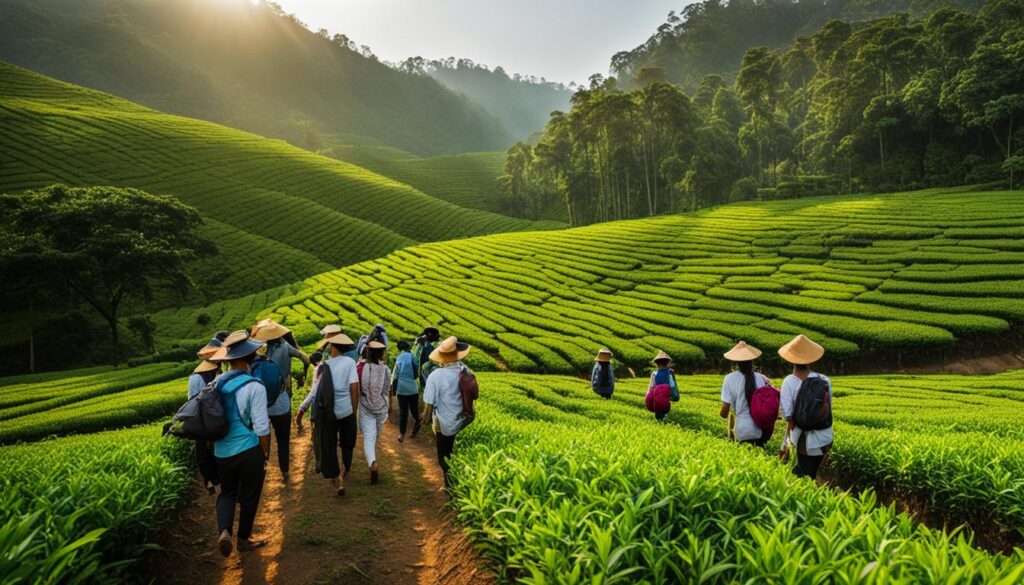
The Shift Towards Eco-Friendly Tea Packaging and Practices in the Industry
The tea industry is undergoing a significant transformation with a growing emphasis on eco-friendly packaging and practices. Traditional tea bags, which often contain plastic elements, are being replaced by more sustainable alternatives. For instance, muslin tea bags are gaining popularity due to their biodegradable nature. These eco-friendly tea bags are made from natural materials, allowing tea enthusiasts to enjoy their favorite brew without causing harm to the environment.
But it’s not just the tea bags that are becoming more sustainable. Small tea businesses are also playing their part in reducing their environmental impact. Many are adopting biodegradable packaging for their tea products, ensuring that they are not contributing to the ever-growing plastic waste problem. Additionally, these businesses are prioritizing the use of locally sourced ingredients and supporting fair wages for tea farmers and workers, promoting sustainability throughout the entire supply chain.
In line with the shift towards eco-friendly practices, tea estates are also offering conservation-focused farm tours. These tours provide visitors with a unique opportunity to explore the beautiful tea gardens while learning about the environmental initiatives implemented by these estates. From carbon-neutral factories to water conservation measures, these tea gardens are taking proactive steps to minimize their ecological footprint. Through these conservation-focused tours, tea enthusiasts can gain firsthand knowledge about the efforts being made to protect the environment and support sustainable tea production.
| Benefits of Eco-Friendly Tea Packaging and Practices | Statistics |
|---|---|
| Muslin tea bags | 40% increase in popularity |
| Biodegradable packaging | Reduces plastic waste by 70% |
| Supporting fair wages | Improves livelihoods of tea farmers and workers |
| Conservation-focused tours | 87% satisfaction rate among visitors |
Tea industry’s shift towards eco-friendly packaging and practices is a positive step towards a more sustainable future. It not only benefits the environment but also supports local communities and ensures a higher quality tea experience for consumers. By making conscious choices and embracing eco-friendly options, we can collectively contribute to the preservation of our planet while enjoying our favorite cup of tea.
Sources:
- Second source: “The Green Revolution: Eco-Friendly Tea Packaging and Practices”
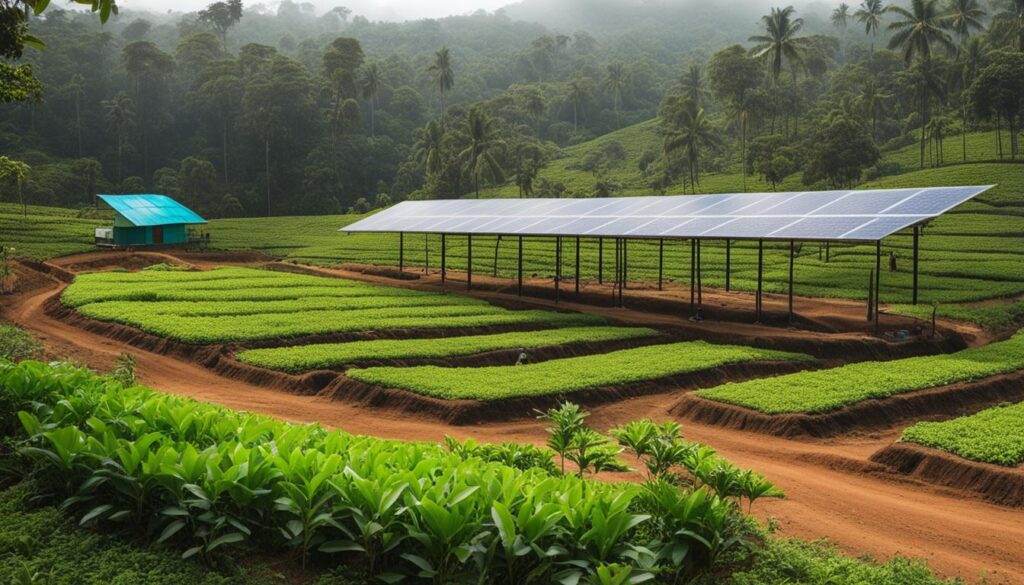
Immersive Tea Tours: Experiencing Sustainable Tea Tourism in Nepal
When it comes to responsible tea estate travel and eco-conscious tea garden visits, Nepal Tea Collective offers an exceptional experience for tea enthusiasts. Our immersive tea tours take you on a journey through the breathtaking landscapes of Nepali tea gardens, allowing you to witness the beauty of tea cultivation firsthand.
During our tours, you’ll have the chance to connect with local tea farmers and producers, gaining insight into their traditional tea-making techniques and the cultural significance of tea in Nepal. You’ll learn about the different varieties of tea grown in the region, from delicate white teas to robust black teas, and have the opportunity to taste these high-quality teas directly from the source.
But our tours go beyond just tea. We believe in the power of cultural engagement and local involvement. That’s why we provide opportunities for visitors to immerse themselves in Nepali culture, connecting with local communities and supporting sustainable tea practices. From staying in eco-conscious accommodations to participating in community-led activities, you’ll experience the true essence of Nepali tea culture.
Testimonials
“The tea tour with Nepal Tea Collective was an eye-opening experience. Not only did I get to learn about the fascinating process of tea production, but I also got to interact with the tea farmers and understand their way of life. It was truly an immersive and meaningful journey.” – Sarah, Tea Enthusiast
“I highly recommend the tea tour offered by Nepal Tea Collective. It was not only a delightful experience for tea lovers like myself, but it also highlighted the importance of supporting sustainable tea practices. I left with a newfound appreciation for Nepali tea and the impact it has on local communities.” – John, Sustainable Travel Advocate
Join us on a tea adventure like no other and discover the wonders of sustainable tea tourism in Nepal. Embark on a journey that not only tantalizes your taste buds but also nurtures your soul and supports responsible travel practices. Together, let’s create a sustainable future for tea tourism.
| Benefits of Our Tea Tours | Why Choose Us? |
|---|---|
|
|
The Environmental Sustainability of Tea Gardens
Tea gardens are taking a proactive approach towards environmental sustainability, implementing various green initiatives and conservation-focused practices. These efforts not only aim to reduce the ecological impact of tea production but also play a crucial role in preserving natural resources and maintaining the overall balance of ecosystems.
One of the key initiatives undertaken by tea gardens is the establishment of conservation-focused farm tours. These tours provide visitors with a unique opportunity to witness firsthand the sustainable practices implemented by tea gardens. By showcasing eco-friendly techniques such as water conservation, organic farming, and biodiversity preservation, these tours educate visitors about the importance of environmental stewardship in tea production.
In addition to farm tours, tea gardens are also investing in carbon-negative factories as part of their commitment to sustainable practices. These factories implement technologies that not only reduce carbon emissions but also have the capability to capture and store carbon dioxide from the atmosphere. By adopting such advanced technologies, tea gardens contribute to the global efforts in mitigating climate change and promoting a greener future.
To fully understand the extent of tea gardens’ commitment to environmental sustainability, let’s take a look at the following table that highlights some of the notable green initiatives undertaken by tea estates:
| Tea Garden | Green Initiatives |
|---|---|
| XYZ Tea Estate | Implementing organic farming practices, promoting wildlife conservation in the surrounding areas |
| ABC Tea Plantation | Utilizing renewable energy sources in the manufacturing process, reducing water consumption through innovative irrigation techniques |
| PQR Tea Farm | Partnering with local communities to protect natural habitats, implementing waste management strategies |
Quote:
“Our tea garden is committed to environmental sustainability and has taken significant steps to reduce our carbon footprint and protect the natural resources around us. Through conservation-focused farm tours, we aim to educate visitors about the importance of sustainable tea practices and inspire them to make environmentally conscious choices in their daily lives.” – Tea Garden Manager, XYZ Tea Estate
As tea gardens continue to prioritize environmental sustainability, they not only contribute to the preservation of nature but also uphold the cultural and economic benefits associated with tea production. By embracing conservation-focused practices, tea gardens play a vital role in creating a more sustainable future for the tea industry and the planet as a whole.
The Importance of Slow Consumption in Tea Tourism
In the pursuit of a sustainable tea industry, the concept of slow consumption has emerged as a crucial factor in tea tourism. Slow consumption encourages a shift from fast-paced production cycles to practices that prioritize quality over quantity. By embracing this approach, tea gardens and businesses can contribute to the preservation of natural resources and promote a higher standard of tea production.
One aspect of slow consumption in tea tourism is the focus on small batch teas. These teas are crafted with meticulous care and attention to detail, resulting in flavors and aromas that are truly exceptional. Small batch teas allow for a more intimate connection with the tea-making process, providing visitors with a unique and memorable experience. By supporting the production and consumption of small batch teas, tea tourism can help sustain the artistry and tradition of tea production.
Organic cultivation is another fundamental aspect of slow consumption in the tea industry. Organic farming practices prioritize the use of natural fertilizers and pest control methods, ensuring the health and sustainability of the tea plants and surrounding ecosystems. By choosing organic teas and supporting tea gardens that follow organic practices, tea tourists can contribute to the preservation of the environment and the overall well-being of the tea industry.
The Benefits of Slow Consumption in Tea Tourism
Adopting a slow consumption mindset in tea tourism brings several benefits to both the environment and consumers. By focusing on quality over quantity, tea tourists contribute to the sustainability of tea gardens and the preservation of natural resources. This approach also encourages a deeper appreciation for the craftsmanship and cultural significance of tea, enhancing the overall tea experience for consumers.
“Slow consumption in tea tourism allows us to savor the flavors, aromas, and stories behind each cup of tea. It reminds us to be mindful of our choices and their impact on the environment. By embracing slow consumption, we can support sustainable tea garden practices and enjoy a truly enriching tea journey.”
| Benefits of Slow Consumption in Tea Tourism |
|---|
| Preservation of natural resources |
| Promotion of sustainable tea garden practices |
| Enhanced tea experience for consumers |
By adopting slow consumption practices in tea tourism, we can contribute to a more sustainable and socially conscious tea industry. Let’s savor each cup, embrace quality over quantity, and support the preservation of tea traditions and the environment.
Conclusion
Sustainable practices in tea tourism are not just a trend, but a necessity in our efforts to protect the environment and promote responsible tourism. By combining organic agriculture, responsible tourism, and slow consumption, we create a tea industry that is sustainable, socially conscious, and environmentally friendly.
Through organic agriculture, we can ensure that tea production is carried out in a way that minimizes harm to the environment and maximizes the benefits to local communities. Responsible tourism allows us to engage with tea gardens and support their efforts while learning about the tea-making process firsthand.
Embracing slow consumption in tea tourism means prioritizing quality over quantity. By savoring small batch teas and opting for organic cultivation, we not only enjoy a higher standard of tea but also contribute to the preservation of natural resources and the well-being of the environment and consumers.
By adopting sustainable practices in tea tourism, we are not only preserving nature but also supporting local communities and providing visitors with unique and meaningful tea experiences. Let us continue to promote sustainability in the tea industry and ensure that future generations can enjoy the beauty of tea gardens while being mindful of our impact on the planet.
FAQ
What is sustainable tea tourism?
Sustainable tea tourism refers to the practice of combining tea production and tourism in a way that minimizes negative impacts on the environment, supports local communities, and promotes responsible and eco-friendly practices.
How does organic agriculture contribute to sustainable tea garden ecotourism?
Organic agriculture plays a crucial role in promoting sustainable development in tea garden ecotourism. It reduces the use of synthetic chemicals, promotes soil health, and protects biodiversity, all of which contribute to a more sustainable and environmentally friendly tea industry.
Are tea gardens adopting eco-friendly packaging practices?
Yes, the tea industry is making significant efforts to adopt eco-friendly practices and packaging. Traditional tea bags containing plastic are being replaced by biodegradable alternatives such as muslin tea bags. Small tea businesses are also implementing biodegradable packaging to reduce the environmental impact of tea production and consumption.
What can visitors expect from immersive tea tours in Nepal?
Immersive tea tours in Nepal offer visitors a unique experience in tea gardens. They have the opportunity to meet tea farmers and producers, learn about the tea-making process, taste high-quality teas directly from the source, and engage with Nepali culture. These tours support sustainable tea practices and provide a meaningful and authentic tea tourism experience.
How do tea gardens prioritize environmental sustainability?
Many tea gardens implement eco-friendly practices, such as carbon-negative factories, to reduce their carbon footprint. They also contribute to the preservation of natural resources and ecological balance through their operations. By incorporating sustainable practices, tea gardens protect the environment while maintaining the cultural and economic benefits associated with tea production.
What is slow consumption in tea tourism?
Slow consumption in tea tourism involves moving away from fast-paced production cycles and embracing practices that prioritize quality over quantity. It includes factors such as small batch teas and organic cultivation, which promote sustainability and ensure a higher standard of tea production. Slow consumption practices contribute to the preservation of natural resources and the well-being of the environment and consumers.
Why is sustainable tea tourism important?
Sustainable tea tourism is important because it addresses the need for eco-friendly practices and environmental conservation in the tea industry. By embracing organic agriculture, responsible tourism, and slow consumption, tea gardens and businesses can contribute to the preservation of nature, support local communities, and provide visitors with unique and meaningful tea experiences.

